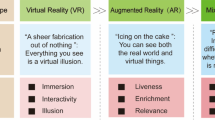Abstract
This paper presents the design and development of a visual pandemic simulator, which is still a work in progress. The goal is two-fold: to make a simulator capable of demonstrating various pandemic and social situations including the current COVID-19 outbreak; and to serve as a platform for activities for graduate and undergraduate education. The paper presents the main steps of building the simulator and the corresponding educational opportunities.
The research is partially supported by the National Scientific Program “Information and Communication Technologies in Science, Education and Security” (ICTinSES) financed by the Ministry of Education and Science; and by Sofia University “St. Kliment Ohridski” Research Science Fund project N80-10-19/19.03.2021 “Integration of competence-based learning in higher education by means of high-tech tools”.
Access this chapter
Tax calculation will be finalised at checkout
Purchases are for personal use only
Similar content being viewed by others
References
The World Factbook 2021. Central Intelligence Agency, Washington, DC (2021). https://www.cia.gov/the-world-factbook/
Alsharhan, A.M.: Survey of agent-based simulations for modelling COVID-19 pandemic. Adv. Sci. Technol. Eng. Syst. J. 6(2), 439–447 (2021). https://doi.org/10.25046/aj060250
Barak, O., Gavish, N., Hari, L.P., Shohat, T.: Simulator of interventions for COVID-19 (2020). https://applied-math.net.technion.ac.il/files/2020/06/Covid_simulator.pdf
Burak, S., et al.: Mathemathical modelling and numerical simulations of COVID-19 spreading-example of Bosnia. Period. Eng. Nat. Sci. (PEN) 8(3), 1566–1579 (2020)
Chertkov, M., et al.: Graphical models of pandemic. medRxiv (2021)
Cleto, C.R., Boulstridge, L., Stenhouse, C., Craig, D.: Using simulation training to introduce medical students to COVID-19 (2021)
Dieckmann, P., Torgeirsen, K., Qvindesland, S.A., Thomas, L., Bushell, V., Langli Ersdal, H.: The use of simulation to prepare and improve responses to infectious disease outbreaks like COVID-19: practical tips and resources from Norway, Denmark, and the UK. Adv. Simul. 5, 1–10 (2020)
Fitó-Bertran, À., Hernández-Lara, A.B., López, E.S.: The effect of competences on learning results an educational experience with a business simulator. Comput. Hum. Behav. 51, 910–914 (2015)
Ghaffarzadegan, N.: Simulation-based what-if analysis for controlling the spread of COVID-19 in universities. PLOS One 16(2), e0246323 (2021)
Ghaffarzadegan, N., Childs, L.M., TÄuber, U.C.: Diverse computer simulation models provide unified lessons on university operation during a pandemic. BioScience 71(2), 113–114 (2021)
Hsieh, J.L., Sun, C.T., Kao, G.Y.M., Huang, C.Y.: Teaching through simulation: epidemic dynamics and public health policies. Simulation 82(11), 731–759 (2006)
Kurth, T., Brinks, R.: Predicting the pandemic (2020)
Lacka, E., Wong, T., Haddoud, M.Y.: Can digital technologies improve students’ efficiency? Exploring the role of virtual learning environment and social media use in higher education. Comput. Educ. 163, 104099 (2021)
Lima, L., Atman, A.: Impact of mobility restriction in COVID-19 superspreading events using agent-based model. PLOS One 16(3), e0248708 (2021)
Loomans, M., Boerstra, A., Wisse, C.: Calculating the risk of infection. REHVA J. 2020(5), 19–24 (2020)
Nishiura, H., Linton, N., Akhmetzhanov, A.: Serial interval of novel coronavirus (COVID-19) infections. Int. J. Infect. Dis. 93, 284–286 (2020). https://doi.org/10.1016/j.ijid.2020.02.060
Peng, B., Pettit, R.W., Amos, C.I.: Population simulations of COVID-19 outbreaks provide tools for risk assessment and continuity planning. JAMIA Open 4(3), 1–7 (2020). https://doi.org/10.1093/jamiaopen/ooaa074
Rubin, D.M., et al.: Facilitating understanding, modeling and simulation of infectious disease epidemics in the age of COVID-19. Front. Public Health 9, 33 (2021)
Siddiqui, A., Khan, M., Akhtar, S.: Supply chain simulator: a scenario-based educational tool to enhance student learning. Comput. Educ. 51(1), 252–261 (2008)
Zea, E., Valez-Balderas, M., Uribe-Quevedo, A.: Serious games and multiple intelligences for customized learning: a discussion. In: Brooks, A.L., Brahman, S., Kapralos, B., Nakajima, A., Tyerman, J., Jain, L.C. (eds.) Recent Advances in Technologies for Inclusive Well-Being. ISRL, vol. 196, pp. 177–189. Springer, Cham (2021). https://doi.org/10.1007/978-3-030-59608-8_9
Author information
Authors and Affiliations
Corresponding author
Editor information
Editors and Affiliations
Rights and permissions
Copyright information
© 2021 Springer Nature Switzerland AG
About this paper
Cite this paper
Boytchev, P., Boytcheva, S. (2021). Visual Educational Simulator of Pandemic: Work in Progress. In: Lopata, A., Gudonienė, D., Butkienė, R. (eds) Information and Software Technologies. ICIST 2021. Communications in Computer and Information Science, vol 1486. Springer, Cham. https://doi.org/10.1007/978-3-030-88304-1_26
Download citation
DOI: https://doi.org/10.1007/978-3-030-88304-1_26
Published:
Publisher Name: Springer, Cham
Print ISBN: 978-3-030-88303-4
Online ISBN: 978-3-030-88304-1
eBook Packages: Computer ScienceComputer Science (R0)




